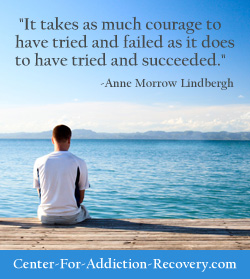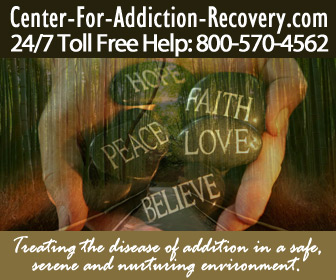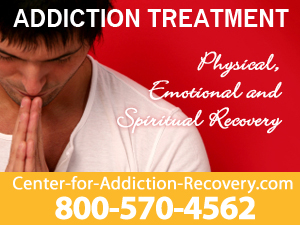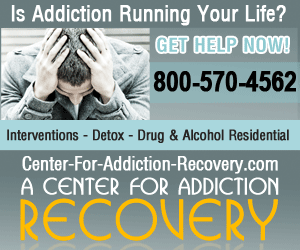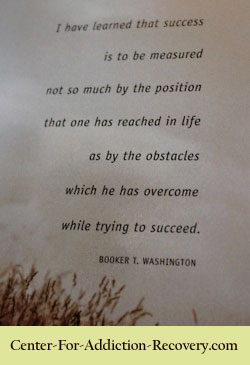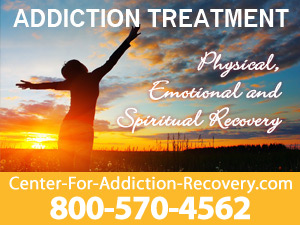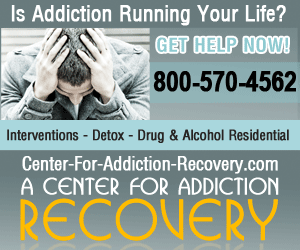Aug 13
9
It Takes As Much Courage To Have Tried and Failed As It Does To Have Tried And Succeeded.
Inspirational Quote of the Week
For information on addiction treatment services and programs, please contact us at
Posted in Inspirational Quotes by .
Aug 13
9
Self Image In Recovery
Drug addiction not only destroys the body, but the mind as well. Psychologists nowadays accept the proposition that a person’s mind, or the identity of oneself, is probably one of the most influential aspects of our overall behavior, decision-making skills, mood changes, and our own self-image. Self-mage in rehab is a crucial part of recovery, mainly because it concerns the condition of the recovering addict at a mental level. Say for example, if an addict decides to change his or her life around, and halt drug abuse, find an accredited drug rehab facility, endure withdrawal, experience detox, and under professional treatment, sacrifice their drug of choice forever—it is safe to say the addict is indeed sacrificing a lot in order to lead a healthy lifestyle. All this is possible, except it is not the family, nor the supporters, nor the physicians who really need to want it; it is the addict who needs to want it more than anyone.
Addiction can drastically affect one’s self-image and even damage it permanently. The reason is because drug abuse tends to ruin a multitude of aspects in a person’s life, such as financial problems, pressure from the law or drug court, disappointed families and friends, health concerns or worries, and of course, physical appearance. We have seen the way many people transform after years of drug abuse; it isn’t a pretty sight. Many addicts must suffer through these trials and tribulations, and prevent themselves from falling into a world of negative self-imaging.
Addiction treatment helps repair such negative self-imaging, by applying cognitive-behavioral therapy and changing the way the addict lives on a daily basis. Through the changes of their actions and day to day life, and living more positively without the use of drugs, clients will see that they can improve their characters. They will gain momentum, and have more positive self-imaging. However, this takes time, and it is important to utilize relapse prevention techniques when undergoing addiction treatment. Aftercare services are also available to keep in touch with the recovering addict after therapy is complete; in such a case, recovering individuals may come back and speak with other clients on their success.
This also brings about better positive self-imaging. Once an individual is treated and changes his or her mindset, the future is open for better opportunities. A positive self-image in rehab is an important factor for recovery, as it provides motivation, inspiration, and the self-love each and every client needs to be successful in recovery.
_____________________________________________________
Since 2002, A Center For Addiction Recovery has been helping families find the courage to find recovery from eating disorders and process addictions, as well as drug and alcohol addictions such as heroin addiction, cocaine addiction, and prescription medication abuse. Florida Center for Recovery assists patients in restoring their lives by embracing a way of life based upon the 12-Step principles of Alcoholics Anonymous (AA), Narcotics Anonymous (NA) and by applying a variety of recovery therapies.
For information on our treatment programs and therapies visit us at:
Center for Addiction Recovery – Addiction Treatment Center:
Center-for-Addiction-Recovery.com ©
Physical, Emotional and Spiritual Recovery
Posted in Addiction Treatment by .
Aug 13
8
Prescription Drug Abuse Epidemic in Pickens County
“The prescription drug abuse problem has become a crisis over the last 10 years” says Dr. Lori Carnsaw of Liberty, who also states that part of the issue with Pickens County’s substance abuse problem is the amount of doctors who find it easier to prescribe a drug (that supposedly treats the patient) rather than educate the patient about alternative options to treat their pain, or discuss addiction/dependency prevention strategies. “We don’t get paid for time”says the doctor, “we get paid for seeing patients.” For Full Article, click here.
Posted in Prescription Drug Abuse by .
Aug 13
7
The Danger Of Waiting For Life To Happen In Rehab
Consider the struggle of an addict. For whatever amount of time that they have been addicted to a substance, there has been the idea in mind that someday they may want to, or will have to, sober up and live their lives. What many addicts experience after prolonged drug use is the sensation that they are stagnant, unmoving, and unsuccessful. For many however, its the disappointment that helps motivate them to seek help.
In rehabilitation, after taking that step to seek help, recovering addicts are basically waiting for the day that they can move onto a healthy life in which they do not need the help of others or drugs to get by. Many are taught that the past is unchangeable. It must be accepted and understood in order to progress to a better future. Just as many however, are not warned about looking too far ahead.
A common mistake that many recovering addicts make while in rehabilitation is constantly focusing on the future. An exponential amount of people, both recovering addicts and sober individuals, spend most of their time looking towards the future. They are thinking of a time of success or better living situations. If this is all a person is planning for, thinking of, and looking forward to, then the question remains as to what are they doing now?
The present is a very obvious time in life. No one can escape it, on drugs or not. It is always there and it is always the moment we are truly experiencing at any given time. Yet many people don’t realize this while they are looking ahead. In recovery, addicts need to start realizing where and what they are doing in the here and now. Simply planning and hoping for a better future is not going to actually make that future come to pass.
After accepting the past, and creating an image in the mind for what is desired in the future, addicts need to put both aside and focus on the present. When in rehabilitation is the time to look at what is directly in front of an individual and work on it. Much of recovery is spent in support meetings, individually or in groups, and there is constant learning. Be it from listening to others’ stories or from listening and talking to a therapist, information and tools are being given and shown in order to correct what the past has set a person up to continue doing. The key is to not take the information gained and say, ‘this is what I am going to do in the future’. Instead, the idea should be ‘I am going to use this now’. By doing in the moment, people would be surprised at how much faster and more accurately that desired future can come to pass.
For those who don’t grasp the idea of seizing the moment, they will often continue to hope and plan for the future. In recovering addicts, never making the change and failing to focus on the present can lead to drawn out paths toward their goals. For many, before long the incessant waiting game can turn into frustration, disappointment, disbelief and eventually some give up all together. What happens next is easy enough to guess. The individuals who give up will generally relapse and revert back to their drug abusive ways. As counterproductive as this is, it will actually feel as if they are finally doing something. And in a sense they are. Those individuals are taking steps in the present to get somewhere. That somewhere is just in the directly opposite direction of their true goal.
If you or someone you know is going through rehabilitation or is about to take that first big step, help them understand the importance of living in the now. Help them understand that changes can be made if they decide to start working and doing, now.
__________________________________________________________________________
If you are looking for a comprehensive addiction treatment program, one that will take you from detox to aftercare, then A Center for Addiction Recovery is the right place for you. Offering a unique blend of traditional and holistic approaches, we’ve been helping clients recover for over 10 years.
Reach out to us. Addiction recovery and detox is just a click or a phone call away. If the information you are looking for is not found here and you need immediate attention you may contact us at:
Center for Addiction Recovery – Addiction Treatment Center:
Center-for-Addiction-Recovery.com ©
Physical, Emotional and Spiritual Recovery
Posted in Addiction Treatment by .
Aug 13
6
Running Turns Addict’s Life Around
For many recovering addicts, the key to recovery can lie in re-establishing healthy habits, routines and lifestyle components. Exercise is one of the most popular and effective habits that help addicts turn away from drugs for good. Running in particular, has been found to adequately turn an addict’s life completely around.
Many drug users lapse into the tendencies of the typical drug addict. Depressant-abusing individuals will become lazier as the time passes. They will accomplish less and become more reclusive and stagnant than non-using individuals. This can lead to prominent weight gain, deterioration of good health and many other harmful and non-desirable results. Alternately, addicts who abuse stimulants will also experience serious health side effects but possibly in different manners. Examples of how a stimulant addict will fall from good health can be dehydration, prominent weight loss and malnutrition, frailty and easy bruising.
Over time these results can turn life into a sickly and unhappy event, and is also why many recovering addicts turn to good health practices as a way to stay focused away from drugs. Building and maintaining health is a good way to not only enforce healthy habits, but get away from the old bad ones.
Running is an exercise that takes considerable endurance, lung capacity, strength and drive to become good at. Even outside of the competitive light, running takes serious dedication from those who want to actually make it a daily or weekly habit. However, running has been found to be strong and beneficial enough to change an addict’s behavior drastically.
But it is suspected that its not just the running, sweating, and healthy exercises that help addicts switch habits. In fact, many believe that the fabled “runners high” has something to do with it. A runner’s high has been reported by many athletes. It occurs after prolonged physical activity in which the body releases pleasure inducing hormones. Some athletes say that once they reach their runner’s high they feel as if they could go on running for hours and hours more. This high, though many believe it is untrue, does occur in most people. Addicts who experience this high during prolonged physical activity might actually be switching addictions, but this time to an addiction that is actually good for them.
Of course moderation is always important. One man from Washington who actually beat addiction through running now runs between 100 to 125 miles per week. He plans to continually raise his mileage until he is happy, which in all honesty is an unplanned mark.
_______________________________________________________
Call A Center For Addiction Recovery and speak to one of our certified drug rehab therapists to find out more about our addiction treatment programs, and how we incorporate various proven therapies like the 12 step program, cognitive therapy and holistic drug treatment therapy to achieve results. Everyday is a new day to make a change. Please contact our drug and alcohol addiction treatment center to speak with a certified counselor about how to begin the recovery process.
Center for Addiction Recovery – Addiction Treatment Center:
Center-for-Addiction-Recovery.com ©
Physical, Emotional and Spiritual Recovery
Posted in Addiction Treatment by .
Aug 13
5
Why Some Soldiers Develop PTSD While Others Don’t
Post Traumatic Stress Disorder (PTSD) is a disorder most commonly associated with military veterans. Symptoms involved include reoccurring hallucinations, dreams or episodes of fear or disturbance due to triggered memories of war time. For some, it can be hard to imagine anything so disturbing that years later it can still plague an individual to the point of not being able to function normally. The idea of war to some is what is seen in actions movies, righteous rescues, incredible wins, and tear jerking losses.
What many are not aware of are the extremely harsh conditions soldiers often experience, the fear for their own lives as well as their group’s lives, and the imminent danger they can face for weeks on end. As we all know, there is only so much an individual can take before the mind is influenced, and sometimes this can be for the negative. Imagining the torture, death, gore and maliciousness that some soldiers face is simply beyond human capabilities. Yet, only some soldiers actually develop PTSD after returning home from their posts.
A group of 260 Vietnam Veterans were examined for causes of PTSD. It was a suspicion that there was more to the development of the disorder than just war-time exposure. There were three factors that were determined to most likely have an impact on the development of the disorder. The first was severe combat exposure, the next was pre-wartime vulnerability (childhood trauma for example) and lastly the involvement of harming civilian or prisoners.
98% of PTSD suffering Veterans was found to have experienced severe combat exposure. Yet out of all soldiers that experienced severe combat exposure, only about 30% on average developed PTSD. This solidified the hypothesis that there were other factors involved in the reason why certain soldiers developed PTSD. It was found that pre-war vulnerability played a strong role in whether or not soldiers would develop PTSD. Those that did experience negative instances before becoming a soldier, such as childhood abuse, were much more prone to developing PTSD. Once the level of involvement in harming civilians or prisoners were thrown into the ratio, the percentage weighed out at 97%.
The results determined that severe combat exposure and pre-war vulnerabilities are the most telling factors in soldiers who did develop PTSD, with the final factor coming in as a close third. With this new information, better procedures are being developed to keep soldiers who may be at a higher risk for developing PTSD away from severe combat experiences.
____________________________________________________________________________________________
Unintentional drug overdoses is a serious matter that has led to many family tragedies and loss of loved ones. The notion of losing someone, whether it’s a friend, a parent, a sibling, or a son or daughter, is a devastating one. A Center For Addiction Recovery has been dedicated for over ten years in providing addiction treatment services and programs for thousands of families nation-wide, and has saved numerous lives as a result. Our mission is not only to treat individuals who suffer from various drug addictions, but also those who suffer from mental disorders such as ADD or ADHD, Bipolar Disorder, and Post traumatic Stress Disorder. Please call today to save a life from the vicious cycle of drug/alcohol addiction, as well as behavioral addictions such as gambling or sex addiction.
Center for Addiction Recovery – Addiction Treatment Center:
Center-for-Addiction-Recovery.com ©
Physical, Emotional and Spiritual Recovery
Posted in Drug Addiction Treatment Drug Use by .
Aug 13
2
What Is Success?
Inspirational Quote of the Week
For information on addiction treatment services and programs, please contact us at
Posted in Inspirational Quotes by .
Aug 13
2
High Price: Challenging Everything You Know About Drugs and Society
In the book HIGH PRICE, Carl Hart, PhD recounts his life growing up as an African American in a rural crack-ridden neighborhood, paired with biological and psychological information on the brain and in the body. His message rests on the government’s actions toward drugs, the effectiveness of their attempts and what is actually happening on the drug front in the U.S.
Much of what Hart has to say is considered controversial yet groundbreaking, as he proves the ineffectiveness of the tactics used today against addiction. The name alone suggests that all things related are taking a specific and serious toll in lives on all levels.
There are hundreds of thousands of Americans across the country who have directly or indirectly dealt with addiction. With the boom in addiction spurred on by the suddenly popular pharmaceutical drugs, there are more than enough people who can relate to Hart in the sense that they have been through the struggle of addiction in someway, and even have possibly grown up around it.
One of Hart’s points lies in the question of how and why is it possible that so many people are becoming addicted to drugs despite the wealth of information available and the action that the government takes against illicit drug use?
One clear failing in the government’s war against drugs is the intense pursuit of drug addicts and the act of jailing them. Many people know that a drug addict who is arrested for drug use, drug sale, drug manufacture or other related crimes will go to jail and then, once released go right back to the drugs they abused. For the people who have lived it, or watched their loved ones go through the vicious cycle, they know how ineffective this is. Since rehabilitation is not mandatory and is not offered, even addicts who go to jail long enough to detox and spend a considerable amount of time sober, once they are freed they have no support or help to remain sober. They are simply released and left to go about their destructive way.
The answer is not per say to change the laws and stop arresting drug related criminals. This unfortunately, would make just as little progress. But in the book HIGH PRICE, there are many such points as these, where two opposing scenarios will not make the desired impact on the drug using community.
So what is left? Hart feels that the best way to combat drug abuse, even in those who have not partaken of it yet, it word of mouth. In his book he writes about how more people supporting the cause to say no to drugs,where spreading truth and support could make exponential improvement in the current standing of the country’s drug abuse problem.
________________________________________________________________
Unintentional drug overdoses is a serious matter that has led to many family tragedies and loss of loved ones. The notion of losing someone, whether it’s a friend, a parent, a sibling, or a son or daughter, is a devastating one. A Center For Addiction Recovery has been dedicated for over ten years in providing addiction treatment services and programs for thousands of families nation-wide, and has saved numerous lives as a result. Our mission is not only to treat individuals who suffer from various drug addictions, but also those who suffer from mental disorders such as ADD or ADHD, Bipolar Disorder, and Post traumatic Stress Disorder. Please call today to save a life from the vicious cycle of drug/alcohol addiction, as well as behavioral addictions such as gambling or sex addiction.
Center for Addiction Recovery – Addiction Treatment Center:
Center-for-Addiction-Recovery.com ©
Physical, Emotional and Spiritual Recovery
Posted in Addiction News and Laws by .
Aug 13
1
New Illegal Drug Called “25I-NBome” Hits Utah Streets
The great state of Utah has recently encountered a new monster drug called the “251-NBOME,” the very name already puts cold shivers down peoples’spine, primarily parents and educators who know about how dangerous it is for their youth to experiment with “the next big thing.” As for simpler versions of its name, the drug has a couple of nicknames like the N-Bomb and 251. Even though it is relatively new, some law enforcement officials have claimed that they have already found some of it in a group of people’s car, and are anticipating more drugs like these within the community. The drug, although little is known about it, is a supposed to be a synthetic version of LSD. For Full article, click here.
Posted in Addiction News and Laws by .
Jul 13
31
The Benefits of Writing Recovery Blogs
Writing about your journey in recovery can be one of the best ideas you’ve had. It’s a means of expressing yourself without the judgment of others, without regard for right or wrong, and with the knowledge that you, and you alone, can look at yourself with total honesty. It’s the last part that makes journalism very important.
Being honest with yourself is something people often have difficulty doing. We tell ourselves everything is alright, even though it really isn’t. We think in the denial of a problem, the problem won’t exist. It’s not that we don’t know the truth; it’s really more about facing the truth. If we acknowledge the wrongs we do, the dangers we place ourselves in, or the people we harm, we will be forced to either accept the fact that we really are fools, or change what we do and how we live.
Sometimes we react to adversity by avoiding it. In our efforts to feel good, we may seek to avoid the pain by abusing mind-altering substances. Without facing ourselves, we can rationalize the use of drugs and alcohol, along with other mind-altering substances, despite the tremendous risks we take when using them. The risks, of course, include our health, our freedom, and our relationships.
When we journal, we force ourselves into a mirror to face ourselves, and address situations in ways that we can manage. On paper, we can yell, scream, comfort, avoid, ignore, destroy, or love our “adversaries,” and they will never know. Adversaries may be people, things, events, locations, or anything that weighs on our mind. The bottom line is, of course, that it helps us to heal and move forward in life.
Understanding yourself is one of the most critical aspects of healing. So long as we ignore our disease(s), they will continue to fester and grow, making healing that much more difficult. When we journal, we begin to see the reality of our lives, and what we are doing, both to ourselves and others. It can be a big step towards a successful recovery.
It isn’t hard to journal. Here’s what you need:
1. A notebook (or a stack of paper, maybe even the other side of printed material)
2. A pen or pencil
3. A few minutes of time
4. Something to write about
That’s it! It’s that easy! It isn’t costly, it isn’t hard to do, and it’s just for you. There is no wrong way to do it, it’s just writing about your day, your behaviors, and your thinking. Why not try it for a week, and see if you can make it happen? You have nothing to lose, and after a few weeks, you’ll have the opportunity to take a look at who you are. If you find you like that person, great. If not, you know what needs to be done.
Today, like Nike says, don’t “try” to do it, JUST DO IT!
______________________________________________________________________________
Many of our licensed counselors, who have also gone through the treatment process, are still in recovery and are willing to share their first-hand experience in order to allow others to follow in their footsteps. In addition, they are able to offer valuable insight into what to expect as well as the do’s and the don’ts of addiction recovery. We treat clients from all over the world, caring for them with the dignity and respect they deserve. Our prescription drug addiction treatment program provides each individual with an opportunity to lead a new and better life by changing their emotional, physical and mental attitudes.
Center for Addiction Recovery – Addiction Treatment Center:
Center-for-Addiction-Recovery.com ©
Physical, Emotional and Spiritual Recovery
Posted in Addiction Treatment Substance Abuse Articles by .

